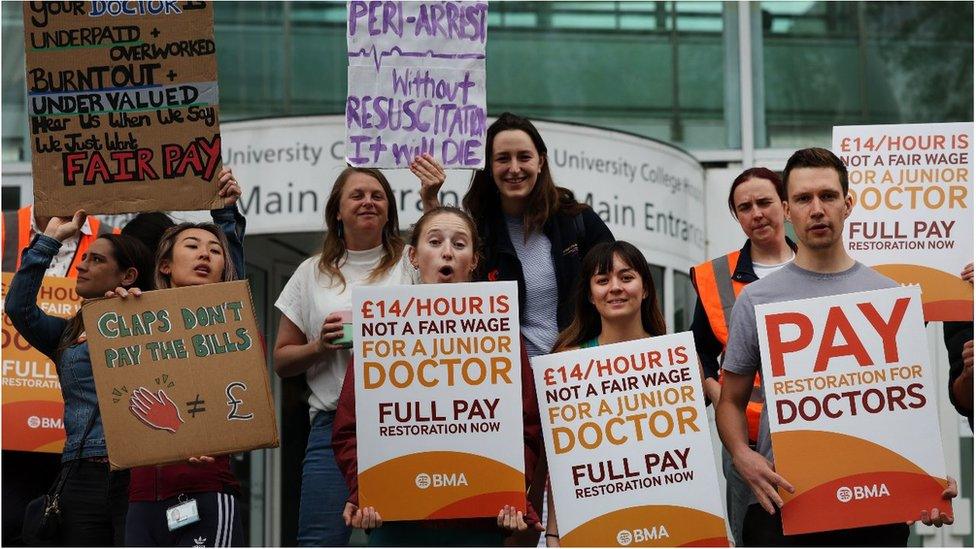Public sector pay: Will rises for doctors and teachers cause inflation?
- Published

Pay rises of between 5% and 7% for public sector workers have been announced by the government, after it accepted the recommendations of pay review bodies.
However, government departments will have to fund some of the increases out of existing budgets.
That is because ministers have repeatedly warned that borrowing money to increase pay for public sector workers, such as junior doctors and teachers, would increase inflation.
Announcing his decision, Prime Minister Rishi Sunak said: "Higher borrowing simply makes inflation worse".
The rate of inflation is the amount that prices are rising. It is very high at the moment and cutting it is a government priority.
Would pay rises push up prices?
In the private sector there is a clear way in which putting up pay could increase prices.
If a company making hats increases workers' salaries, then it may need to charge customers more in order to do so.
But that doesn't work for public sector workers, who are employed directly by the government.
If teachers at state schools are paid more, for example, sending children to state schools will still be free to parents. Taxes may have to rise, but we'll return to that.
Another possible cause of inflation is the amount of demand for goods and services in the country. The idea is that if there is a fixed amount of stuff available to buy - and people have more money to spend - prices go up.
This is where pay rises could come in to play.
"If the government raises public sector pay then that increases demand in the economy at a time when the Bank of England is desperately trying to reduce demand," says Ben Zaranko from economic think tank the Institute for Fiscal Studies.
But he adds that it's not a huge effect. He estimates, external that giving a 6% pay rise instead of a 3% pay rise to the approximately 2.5 million workers covered by the pay review bodies would mean spending about £5bn. That is less than 0.2% of the size of the UK economy.
The impact of that is reduced because some of the money is paid straight back to the Treasury in workers' taxes.
Where does the money come from?
There were various options to fund public sector pay rises.
The government could raise taxes, which would reduce demand and could in turn reduce inflation. But the government is reluctant to do that during a cost of living crisis.
It could just print the money, but that is widely considered to be inflationary.
And the government says it will not borrow the money. Chancellor Jeremy Hunt said in a speech on Monday: "More borrowing is itself inflationary".
It is not clear why that would be the case.
"If the government borrows more it is either to spend more or tax less, both of which increase demand," says Paula Bejarano Carbo from the National Institute of Economic and Social Research think tank.
"It's therefore the spending or the tax cutting that can be inflationary, rather than the borrowing in itself."
We asked the Treasury to explain how borrowing increases inflation but have not yet heard back.
Worker shortages
Instead, the government's plan is to make departments spend less on other things to fund the pay rises. This should reduce demand, to balance the increased demand from pay rises.
But there is also an inflationary danger if departments cut back services to fund pay rises, according to Wendy Carlin, professor of economics at UCL.
One of the key drivers of rising prices has been shortages of workers in some sectors.
"Anything stopping the NHS functioning properly is exacerbating inflation by stopping it getting people back to work," she says.

